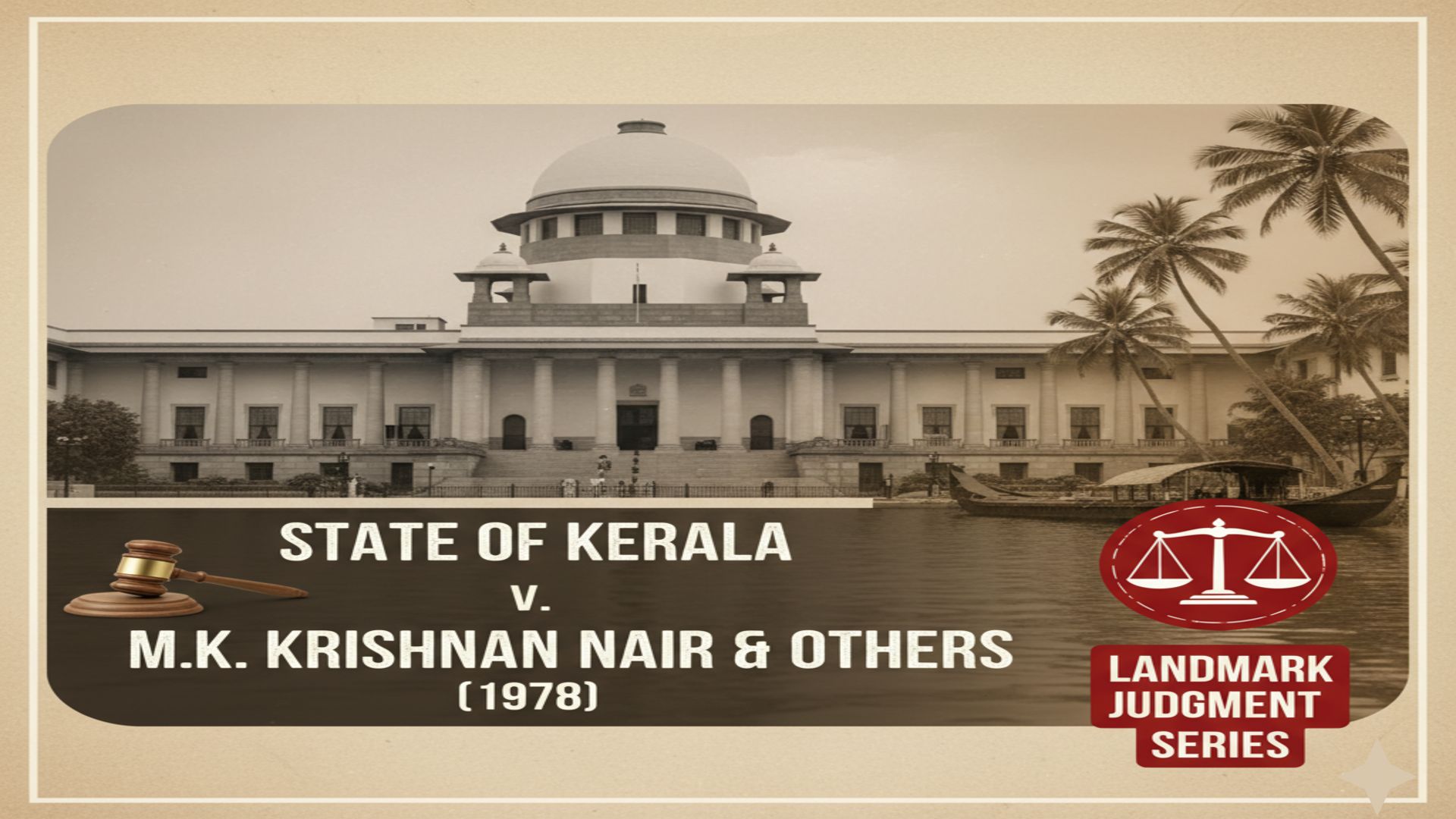
Case Summary: State of Kerala v. M.K. Krishnan Nair & Others (1978)
**Case Stats:**
Name of the Court: Supreme Court of India
Case No: Civil Appeal No. 2047 of 1974
Date of Decision: 14-02-1978
Bench: M. Hameedullah Beg, C.J; V. R. Krishna Iyer, J; V. D. Tulzapurkar, J; S. Murtaza Fazal Ali, J; P. N. Shingal, J; P. N. Bhagwati, J; Jaswant Singh, J
Type of Bench: Full Bench
Final Decision: Allowed
Citations: AIR 1978 SC 747; (1978) LabIC 723; (1978) 1 SCC 552; (1978) 2 SCR 864
[Judgment Source]
https://www.courtkutchehry.com/Judgement/Search/AdvancedV2?docid=270602
Facts of the Case
The State of Kerala bifurcated its Judicial Service into two wings—Civil and Criminal—via Government Orders dated February 12, 1973 and September 18, 1973. The Kerala Civil Judicial Service Rules, 1973 and Kerala Criminal Judicial Service Rules, 1973 were introduced accordingly. The bifurcation allowed only those officers ‘originally borne on the Magistracy’ to opt for the Criminal Wing. M.K. Krishnan Nair, a Civil Judicial Officer, challenged this scheme and rules as violating Articles 14 and 16 of the Constitution, claiming that an integrated Judicial Service already existed in Kerala and restricting option was discriminatory.
Law Points Raised
1. Whether an integrated Judicial Service existed in Kerala before February 12, 1973.
2. Whether bifurcation into Civil and Criminal Wings violated Articles 14 and 16.
3. Whether restricting option to officers ‘originally borne on the Magistracy’ was discriminatory.
4. Whether the State had the power to create separate cadres and rules for each wing.
Acts / Provisions / Articles Referred
• Constitution of India — Articles 14, 16, 234, 309
• CrPC, 1973 — Sections 10, 12, 13
• Kerala Civil Judicial Service Rules, 1973 — Rule 18
Judgements Referred
• State of Mysore v. Krishna Murthy (1973)
• P.S. Menon (Kerala High Court Full Bench)
Obiter Dicta
The Court observed that the State can constitute separate cadres for administrative convenience. However, to claim discrimination under Articles 14 or 16, it must be shown that persons belong to the same class and are treated unequally. Without proof of prior integration, no such claim arises.
Ratio Decidendi
The petitioner failed to prove that a fully integrated Judicial Service existed before bifurcation. Civil and Criminal judicial officers were historically separate cadres. Therefore, bifurcation and classification based on prior service in the Magistracy was reasonable and had a nexus with improving criminal justice administration.
Final Ruling
The Supreme Court set aside the Kerala High Court's judgment and upheld the bifurcation of the Kerala Judicial Service into Civil and Criminal Wings. The restriction of option to officers ‘originally borne on the Magistracy’ was not unconstitutional.
Summary
This case upheld Kerala's power to bifurcate its Judicial Service into Civil and Criminal Wings. The Court ruled that Articles 14 and 16 were not violated as no integrated service existed before bifurcation and the classification was based on an intelligible differentia with a rational nexus to the objective of improving criminal justice. The appeals were allowed, and the High Court’s contrary decision was overturned.
[Judgment Source]
https://www.courtkutchehry.com/Judgement/Search/AdvancedV2?docid=270602